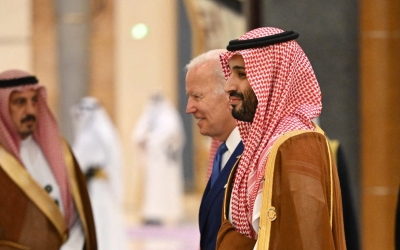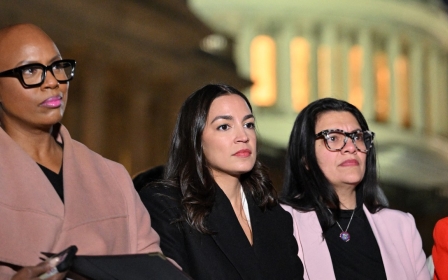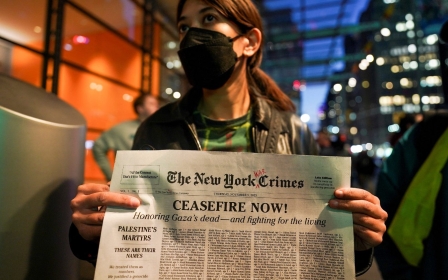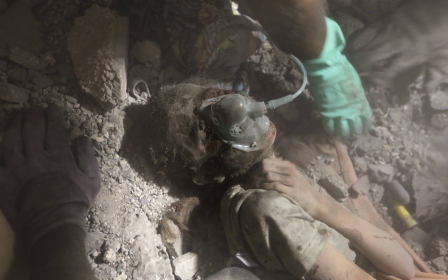Israel-Palestine war: Saudi Arabia detains worshippers praying for Gaza in holy sites
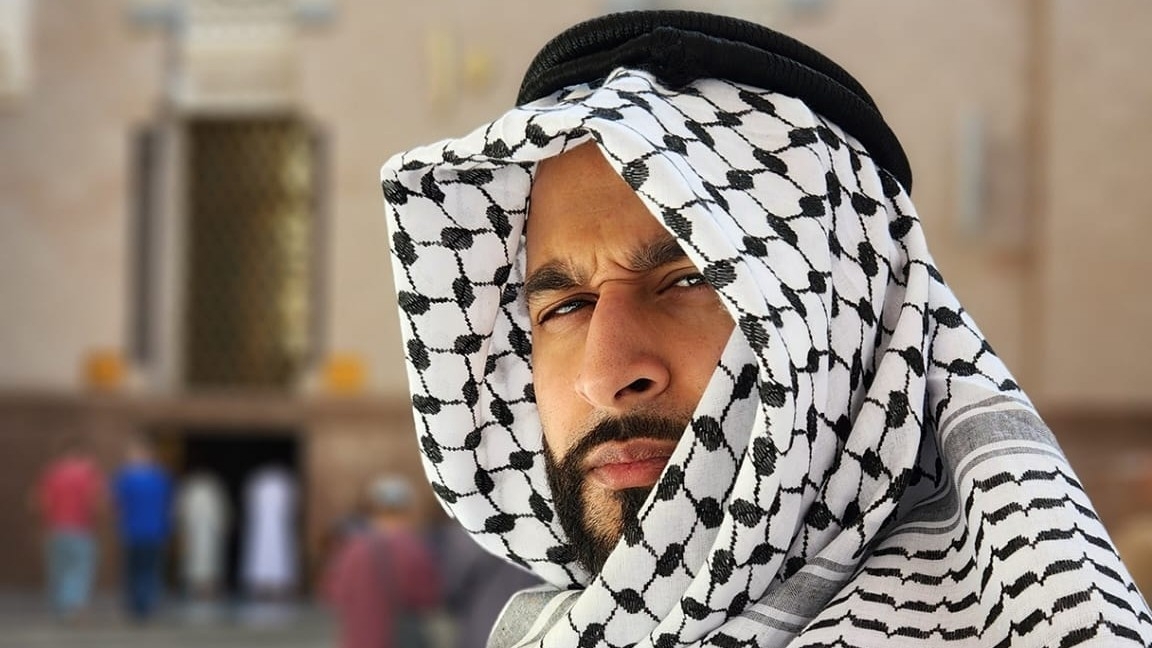
Saudi Arabia is detaining worshippers displaying shows of solidarity for Gaza and praying for Palestine at holy sites in Mecca and Medina.
A British actor and presenter who was on a religious pilgrimage with his family in Mecca said he was detained by soldiers for wearing a Palestinian keffiyeh.
Islah Abdur-Rahman decided to go on the Islamic pilgrimage in late October, and has raised concerns over the crackdown on any symbols or displays of solidarity for Palestine in Saudi Arabia.
“I was stopped by four soldiers for wearing a white keffiyeh around my head and a Palestinian coloured tasbih [rosary beads] around my wrist,” he told Middle East Eye.
“I was escorted to an off-site location where they detained people for possible crimes or offences. Once I was detained, there were other soldiers who interrogated me and asked me about my nationality, why I’m here, where I travelled from, how long I’m here for.”
New MEE newsletter: Jerusalem Dispatch
Sign up to get the latest insights and analysis on Israel-Palestine, alongside Turkey Unpacked and other MEE newsletters
The soldiers then asked Abdur-Rahman to replicate how he was wearing the keffiyeh, while they discussed it and took his visa.
“It was evident that the scarf was the issue,” he said. “They were talking in Arabic but they kept saying 'Palestinian keffiyeh' and looking at the scarf.
“Eventually, when I was let go, a worker came up to me, picked up my scarf and said, ‘This is not good, Israel-Palestine is not good, so don’t wear it, it’s not allowed.'”
Abdur-Rahman was then made to sign a release form and give his fingerprints, after handing in the keffiyeh.
‘Fear turned into heartbreak’
The last place Abdur-Rahman expected to find himself in was a detention centre, during what was supposed to be a spiritual religious pilgrimage. The experience was a complete shock.
“At first, I was really scared, because I was in a country that’s not mine, I have no rights and they could do anything to me and I would not have a say, so I was afraid,” he explained.
“Then, my fear turned into heartbreak… the heartbreak got worse when I realised that this is just an ounce of what Palestinians must go through.”
Follow Middle East Eye's live coverage for the latest on the Israel-Palestine war
Abdur-Rahman described the experience as “upsetting”, especially as it happened in a place of worship, and during Israel’s relentless bombing of Gaza, which, since 7 October, has killed over 11,000 Palestinians, including more than 4,000 children.
“It made me realise how Palestinians in Gaza and in their country must feel being treated by the Israeli government, and the abuse they get just for being Palestinian. If anything it broadened my empathy even further than it already is,” he said.
Abdur-Rahman decided to share his experience on Instagram, saying that he did “not want to give the wrong impression of Mecca, which is a beautiful place,” but rather he wanted to shed light on how Palestinians “don’t have a voice”.
Since sharing his experience, he says he has been on the receiving end of online hate messages from Saudi Arabians, who defended what happened and said that no displays of flags or symbols are allowed in places of worship.
“There is a universal Muslim understanding that this is not a random country and that Al-Aqsa in Palestine is one of the holiest sites in Islam… so I thought it would be OK. I have also received stories from people who have gone through what I’ve gone through and they got in trouble,” he said.
Detained for praying for Gaza
Abdur-Rahman’s story is similar to other testimonies shared online.
In one video shared on social media on 10 November, an Algerian man who was taking part in a pilgrimage in Saudi Arabia describes being arrested by Saudi authorities “for sympathising with Palestinians and praying for them”.
“I was detained for more than six hours for supplicating for our brothers in Palestine,” he says in the video.
“I am not sharing this just for the sake of it, I would like to warn people everywhere, especially those who are coming to the holy sites in Mecca and Medina. I was not talking about politics or regimes.
“In Medina, I did my prayers and I took the opportunity to supplicate for the children and victims in Palestine… is it a crime to pray for the oppressed? I did not know that this was forbidden in the holy sites.
"I had not even finished my dua [prayers] before soldiers came and took my phone and they made me delete a video where I was praying for people in Gaza.”
The man said that he was taken to different police stations and that he tried to explain he was simply praying, and that he deleted the video as soon as he was asked to.
“I have high blood pressure and I’m diabetic, but was held for six hours. I was treated like a criminal and told that I was detained for ‘sympathising and praying for Palestine’ and my fingerprints were taken,” he said.
He ends the video by warning people to be careful when visiting the holy sites, and that he was told he was lucky he was released, and that he has heard that others were held for much longer. He also noted that an Indonesian woman, who had a Palestinian flag on her hijab, was also detained.
Prominent sheikhs have also hinted that people should not make explicit comments or gestures regarding the war.
On 10 November, the head of Saudi Arabia’s religious affairs at the Grand Mosque, Abdul Rahman al-Sudais, suggested that people should not interfere or get involved in what is happening in Gaza.
“You are seeing what is happening to our brothers and sisters in Palestine, what else should we do towards them, other than pray for them,” he said.
“Muslims should not give in to these provocations and let the events divide them. They must refer back to their guardians and authorities, their scholars, and not engage in what they have no right to engage in.”
This article is available in French on Middle East Eye French edition.
Middle East Eye delivers independent and unrivalled coverage and analysis of the Middle East, North Africa and beyond. To learn more about republishing this content and the associated fees, please fill out this form. More about MEE can be found here.


